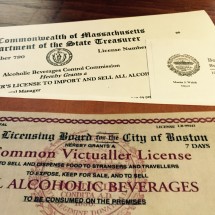Law Offices of John P. Connell, P.C.: The owner of an alcoholic beverage license possesses a significant and transferable asset, the value of which depends upon the “market” for such licenses in the municipality where the license was issued. The owner of an all alcoholic beverage license for on-premises service in Boston, for example, can sell its license to a qualified buyer for up to $250,000.00 in some neighborhoods (the “Market Price”), when the actual cost of obtaining or renewing that license per year from the City of Boston is approximately $3,000.00 (the “Actual Price”). As there are rarely new available on-premises all alcoholic beverage licenses available for issuance in the City of Boston, most businesses seeking a license will pay the Market Price.
The issue arises from time to time, however, where a licensee is presented with the opportunity to sell an existing license at Market Price while at the same time replacing that license with one that may be available in the local municipality at the Actual Price. While tempting for most business people, switching licenses can be dicey.
In late August 2012, a liquor store owner in Peabody agreed to sell its all alcohol license to Trader Joe’s for $205,000.00, the Market Price, and the request was made to the City’s licensing board to approve that transfer. At the same time, however, the liquor store owner requested the City of Peabody to issue him a new beer & wine license, the Actual Cost of which is approximately $2,000.00. The liquor store owner had only acquired its all alcohol license last year and could have acquired the lesser coveted beer & wine license at that time if that is how he intended to operate its business.
The liquor store owner’s request to essentially sell a recently acquired City issued license for over $200,000.00 and at the same time request the City to issue him a new license raised serious concerns with the Board. Peabody Licensing Board member Charles Holden inquired into the “ethics” of such a transaction, posing the query: “Using a license as a profit vehicle…is it legal? Yes. Is it ethical?” Holden then went on to state, “I have no problem with him selling the license, but I would look long and hard at him getting a new license.”
Therein lays the rub for the liquor store owner— the local licensing authority possesses discretion when deciding whether to issue a new license, and a suggestion that the licensee applicant is acting “unethically” in selling a City issued license may prevent the switching of licenses, because it may be viewed as “trading” in City issued assets. Holden stated that the “ethical” thing to do for this liquor store owner would be to turn in the all alcoholic beverage license to the City, if he did not want it, and apply for the beer & wine license that he apparently does want, rather than profiting from a City issued license he apparently never intended to use.
Trading licenses in the industry is therefore cautioned. The Peabody Licensing Board will revisit this matter in October, so stay tuned.


Hello There. I found your blog using msn. This is a very well written article.